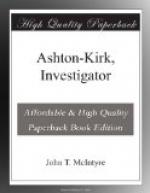“However, here was an opportunity to perhaps aid him; and I set to work. In a few hours next day I had located every person of the name of Hume in the city. Mr. Morris is a consulting engineer. Anyone named Hume who, from his occupation, would be likely to have dealings with him especially attracted my attention. There were only a few, and long before the day was over I had satisfied myself by personal visits at their places of business that they did not even know him.”
Ashton-Kirk smiled. One of his well-kept hands patted applause upon the arm of his chair.
“You are strong,” said he. “I recognized your type when you came in. It is a pleasure to have one’s judgment so thoroughly and satisfactorily proven.”
Miss Vale looked pleased.
“I am glad that you approve of what I did,” she said. “I confess I had some hesitancy, but not enough to prevent my carrying out the design. But when the first effort proved without result, I set about making a study of all the Humes in the directory. I had my secretary make me a typed list of them, with their addresses and occupations, and I pored over this for hours at a time.
“There was one that caught my eye after a while; probably this was because of the unusualness of his business. The directory gave him as a numismatist; but I drove by his shop in my car, and the sign over the window said that he was also a dealer in curiosities of art.
“This gave me an idea. Mr. Morris is an ardent collector; his hobby is engraved gems, and for a man of his means his possessions in this line are quite remarkable. It was easily within the range of possibility that he had had transactions with this particular Hume—at least that he was acquainted with him. The more I thought of this, the more curious I grew; and one afternoon I paid the place a visit. It is on the second floor, the entrance is through a side door and up a narrow, dusty stairway. Then I had to make my way along a dark windowless passage to the office, or shop in the front.
“This shop was well lighted, and literally stuffed with what were well termed ‘curiosities of art.’ I never before saw such queer carvings, such freakish pottery, such weird and utterly impossible bric-a-brac. At a table sat a flabby looking man with a short sandy beard. One glance told me that he was an habitual drunkard, for he had the sodden look that is unmistakable. But when he arose and bid me good evening his manner struck me like a blow in the face. Allan Morris had spoken of a mocking person who jeered and smiled. And that described this man exactly. There was mockery in every glance of his dull eyes; every twitch of his mouth was a fleer; with each gesture he seemed making game of one; sneering incredulity was stamped all over him.”
Ashton-Kirk leaned forward with keen interest.
“My manner must have betrayed me,” the girl went on, “for I saw an inquiring crease come into his forehead. When he asked the nature of my business his voice was sharp and insolent.




